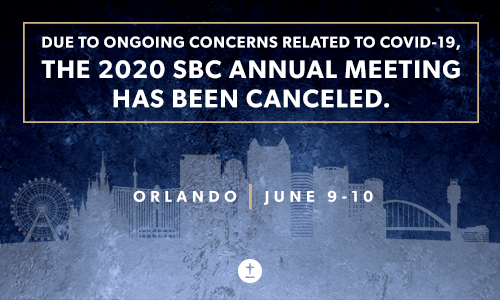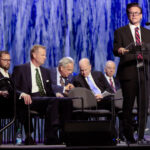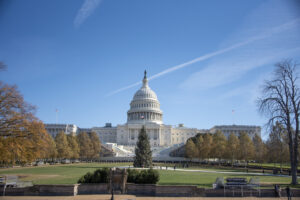
NASHVILLE (BP) – Only World War II had sidelined the Southern Baptist Convention’s annual meeting until COVID-19 came along.
The 2020 SBC Annual Meeting was canceled amid safety concerns during the pandemic. The decision was made March 24 by SBC officers, the SBC Executive Committee and leaders of SBC boards and institutions, following SBC constitutional guidelines.
Ronnie Floyd, president and CEO of the SBC Executive Committee, said the decision “was not easy” and created a “very real void.”
Business continued at different levels in various areas, but SBC Executive Committee Chairman Rolland Slade said the cancellation impacted more than business.
“When we hold the meeting in person there are opportunities to sit and reason together, to press into our commission to share the Gospel to the world and to take care of the family of God,” Slade said. “Those opportunities come during breaks between sessions or the late night dinners, when we relax and listen to each other. It is in those moments that we truly come together as brothers and sisters. That is what I missed most this year.”
Slade, pastor of Meridian Baptist Church in El Cajon, Calif., was elected SBC EC chairman during a special called meeting held June 16 on a virtual platform. That’s the way much business was done during the pandemic, on virtual platforms such as Zoom. Many matters were simply assigned to June 2021, but SBC governing documents don’t allow for a virtual annual meeting. Previous annual meetings were deferred in 1943 and 1945 during wartime restrictions.
The cancellation of the annual meeting, which was scheduled June 9-10 in Orlando, Fla., postponed consideration of several key matters, including two pending amendments to the SBC Constitution addressing racism and sexual abuse. The Cooperative Program Allocation Budget was adopted by the Executive Committee, acting with ad interim authority, during a September meeting.
Gone was the opportunity to elect new SBC officers; President J.D. Greear, pastor of The Summit Church in Durham, N.C., remained in office for a third year, as did the other officers. Members of many SBC committees remained in office, as well. Expiring terms of SBC entity trustees depended upon each entity’s individual charter.
“We had not missed being together since 1945,” Floyd said. “We would never have imagined we would be in that moment, but it happened, and we had to move forward. But even though we could not meet, the work of the Southern Baptist Convention went forward. Churches continued to minister to their communities. Southern Baptists continued to pool their resources through the Cooperative Program. Missionaries continued to be sent out.
“We did not get to be together, and this is a very real void from missing that. But we never stopped moving toward the goal of reaching every person for Jesus Christ in every town, every city, every state and every nation.”
Slade agreed that the cancellation left a void in SBC life.
“There is something that happens when we are together in the convention hall worshiping and praising our Lord before we get or go into convention business,” Slade said. “Those moments bring us together and remind us of our purpose for being there. We travel miles to come into those moments. Oftentimes we may not have seen or spoken to each other since the last meeting, yet when the worship begins all that is forgotten. We may have come to the meeting with intentions that change when our hearts are brought together in worship.”
In June, while recognizing it would not and could not replace the annual meeting, Floyd hosted SBC Advance, an online broadcast that updated Southern Baptists on the health of various entities and state conventions. Entity leaders offered brief reports and Greear gave an address.
“Our goal with SBC Advance is to inform you of all that is happening in the SBC,” Floyd said in June, “and inspire you to continue to join us in this work.”
Among SBC entities, the terms of 129 trustees expired in 2020 and would have been filled during the annual meeting. With the cancellation, entity oversight continued through an alternate system of trustee selection that varies among entities. For instance, trustees of 10 entities will remain in office until their successors are elected in 2021, even after their terms expire in the interim. The remaining two entities, GuideStone Financial Resources and the Southern Baptist Theological Seminary, announced plans to appoint interim trustees.
As SBC Recording Secretary John Yeats said in June, since the SBC has a “rotating system” of trustees, “missing a year of being able to elect brand new trustees as a convention shouldn’t hinder us.”
Other matters, including the approval of members of the SBC committees, will wait until the 2021 SBC Annual Meeting, set for June 15-16 in Nashville.
Randy Davis, president and executive director of the Tennessee Baptist Mission Board, is among those looking forward to the meeting.
“All of us missed gathering at the 2020 Orlando SBC. Christians are made to be together. From breaking bread, worshiping, or sharing the Gospel, we are designed as one body in need of one another,” Davis said. “And my, how we need to gather in Nashville in 2021. It will be a grand opportunity to embrace a fresh vision for Southern Baptists fulfilling the Great Commission with unified hearts. The old adage of ‘extending the right hand of Christian fellowship’ has never been more needed and welcomed.”
But as Greear affirmed shortly after the 2020 meeting was canceled, the collective ministry and mission of Southern Baptists would continue.
“The work of the SBC can go on without the meeting,” Greear said in March. “Why? Because the headquarters of the SBC is not in Nashville or Orlando, nor is our primary impulse for ministry what happens on the Convention floor. The headquarters of the SBC is the local church. Our strength is in our pulpits and pews. Our ministries will still go on.”






















